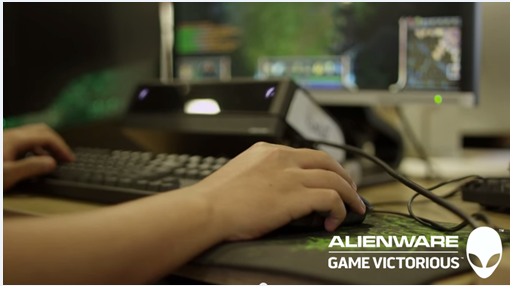
Featured Blog | This community-written post highlights the best of what the game industry has to offer. Read more like it on the Game Developer Blogs or learn how to Submit Your Own Blog Post
The Science of E-Sports Performance
Right now the League of Legends World Championships are drawing record views (and forcing me to wake up at ungodly hours to catch all the action). I want to show people a different perspective, how physiology factors into competitive gaming performance.

The gaming world is evolving. E-sports is a real thing, and it influences the games some developers set out to make. The same things that entice people to watch traditional athletics, draw people to competitive gaming. They want to see people competing in a game they understand, love, and play, but doing things they believe are almost superhuman. We love to label these feats as the results of hard work and dedication, god given talents, and/or just a shot of luck. Lucky for me, people love to turn to science to explain the "reality" behind the magic.
Sports science is a massive field which I and many others find fascinating. Usually sports scientists are high level athletes who decided they liked analyzing and understanding excellence enough to pursue it with the same ambition they pursued their own athletic excellence. The circumstances by which they make the career shift are variable (injury, finance, skill), but their passion is not the least bit dulled.
My mentors, Dr. Joyner and Johnson were high level competitors in their prime, with the latter being a fraction of a second away from representing the US in rowing Olympics … or so he tells me! When Sports Science becomes standard in E-sports (ETA 5 years), I predict and hope that we will see a similar trend: passionate thinkers in the pursuit of the subtleties of excellence.

Physiologic testing techniques and protocols have been established at a world class level to investigate Olympians and athletes.
Back when competitive gaming was a backwater activity with sub 50k prize money, I used to play competitively for Team Fnatic, World of Warcraft to be specific. Although our team always placed second at major events, I knew what I had to do to place first. Practice more, sharpen my execution, and learn more classes.
The truth is I lost interest and motivation, stopping WOW cold turkey shortly after my 4th major tournament. Maybe if I wasn’t playing WOW, but a better game... one designed specifically for human competition? Maybe if I had not been trying to juggle a demanding academic PhD program and found splitting my energy so draining? Lots of maybes, but I think the result would have been the same.
I was more interested in understanding excellence in gaming than spending countless hours honing my micromanagement skills to be able to employ the strategies I desired. I dedicated myself to learning from other disciplines and their study of greatness. Optimization of human performance in traditional athletics is a well-studied field, yielding much transferrable information.
However, research I did in the lab wasn't enough to keep my curiosity satiated. I studied martial arts, and practiced yoga trying to understand the principles of performance optimization and flow.
I devoured information from countless books and blogs , all while playing games competitively as much as time allowed… waiting for the rise of E-sports.
Performance: Definition and Measurement
First, let’s begin by defining performance and breaking down the major principles. I will draw heavily and summarize some of my previous work, which you can check out here. Performance is a culmination of all the preparation up until the present point in time, and the ability to execute in that moment.
Although it can be difficult to gauge the quality of preparation throughout the lifetime of an individual, it is even harder to predict an individual’s ability to execute in the moment. Perhaps the only thing which allows us to predict execution is previous history of being reliable. Studying your physiology just gives us an idea of your potential, but we can rarely gauge ability to perform without looking at previous history.
Performance in the video game realm can be split into two main categories: physical and mental. Are you fast and practiced enough to input the correct sequence at the correct time? That defines physical performance capacity. Is your mind quick enough to process the current information on screen, or even all the information that has passed, and then using your ability to react and anticipate, make the optimal in-game decision? That encompasses mental performance capacity. Quantifying players in these two categories can get incredibly complex really fast, especially when we factor in team dynamics.

All of the skills in the above image are critical for winning at most video games. They are also critical for the performance of air force pilots.
After studying high level traditional athletes and specifically fighter pilots, I realized that performance under stress in a demanding environment is precisely what we do as gamers. I decided that if I could study the elite players, I might be able apply some of my findings to the other projects I was working on.
Pilots are highly reliant on their HUD and are constantly multitasking several different chunks of information to make optimal decisions under combat stress, but nobody can really study their performance in combat (outside of simulations) because the tools to monitor humans has not been employed yet. The same “life or death” situations are considerably easier to study in E-sports athletes. What did I have to lose, besides all my time studying gamers?
Scientific Study
Almost two years ago, I began to contact various entities from Valve to Riot to Day 9 to see if they knew anyone who was interested in my goals. After a lot of polite rejections and non-replies, I connected with Steve, the manager of Curse E-sports. Steve is a brilliant guy; he treats the management of a team like a professional athletics institution and is always looking towards the future. After a few trials and hard work, we finally got to film the video you see here.
The idea was to begin to understand what distinguished outstanding players from the rest, and, much like traditional athletics, how can we detect strengths and weaknesses of these players and build training programs to optimize performance. Let's break down the thought process and methodology behind the research. To quantify mental and physical performance capacity, we needed to be able to specific tools and tests to assess each individually.
Physical Performance was assessed with a test that we had previously designed in house to help us detect cognitive degradation with altitude and hypoxia. It is a simple hand-eye coordination test measuring speed, reaction time, and accuracy. There are many tests that exist that perform a similar function; we used ours because it was designed for this role rather than “can also be used for this role”.
Mental Performance can be broken down into two key components: ability to process information necessary for decision making, and the ability to cope with stress. To get at these two components I decided to use two tools: an eye tracking device and a biometric shirt that allowed me to measure heart and breathing rate (along with a few other things that are not so important for this study).

Eye tracking positioning used to capture data of players in a League of Legends match.
Eye tracking is like a gateway to the human brain; if you can see where someone is fixated you can begin to understand their thought process when problem solving. On the other hand, heart rate and breathing rate are our first line of defense to perceived stress; they fluctuate with our emotional state.
What did we find? First and foremost, we discovered that we have a very small sample size considering individual physiology, skill, and role differences. We found that players of similar speed and accuracy were distributed across the varying skill brackets. In the video you can see these points as well as the difference in gaze fixation and reaction in game. Again, the study is preliminary, with no real source of funding, all executed under free time with the generous help of those involved.
What do I think we found? Contrary to the popular belief, in League of Legends mechanical skill is likely not the differentiation factor between great players. As believed by many higher level players, decision making and confidence under stress are paramount to optimal performance. For those interested in details, I go into a deeper dive with what I have had a chance to analyze in my latest article. I plan to continue to put forth the analysis for all to see as I work through the rest of the data.
Is this true in other games like FPS and Fighters? I don’t know! I’ve read articles from great players saying they don’t think so either, but l those one frame combos are soooo hard for me to pull off consistently! It would be amazing to research and find out where the line for human performance is really etched; to explore the differences between players of different genres, and the requirements and skills that develop from participation in each.
Final Word
Recent events at the LOL World Championship have been so amazing I feel compelled to leave you with one of the most amazing games I have ever seen. If you are a League of Legends fan, you probably have already seen it. If you know anything at all about how these type of games work, you can probably appreciate it. Wether E-sports is a "real" thing or not doesn't matter when something is so enjoyable to watch.
The field of sports science is truly beautiful and I think that the field of E-sports science can be just as profound. In essence, they are not disparate fields. The discoveries made in the field translate to the average participant, increasing their enjoyment and fortifying their well-being while playing. I think we can reap similar benefits in the video game realm.
From a design perspective, I can imagine that building physical and mental requirements into a game can lead to many interesting challenges when crafting a competitive title. I remember slogging through pages and pages of a debate on execution requirements in fighting games on sirlin.net. Sirlin's site just got redisigned and I can't seem to find the original article with the huge discussion in the comments, but the huntlead me to a few other gems around the topic.
Are one frame combo windows and tight execution requirements good? Or should fighting games lower the execution demands and allow everyone to engage in the mental battles? I have always found these game design question interesting, and have enjoyed reading great thoughts on the matter.
Now imagine that we were able to gauge human capabilities, had the data to construct statistical distributions, and understand the limits of the audience. I’ve read these discussions on game design blogs, sirlin.net, and Gamasutra, so clearly much thought has gone into the topic. What if we managed to use science to support decisions in this field?
I am very interested in hearing the thoughts of the designers that frequent this site. How important is the competitive aspect of your game and gearing towards e-sports? What performance skills do you stress in your designs and challenge players to aspire to? How can research like this help you, if at all? Happy to continue the discussion here or on twitter @Dr_Uthgar.
I am sincerely grateful to Christian at Gamasutra for an opportunity to present my thoughts to a new audience. I would also like to thank Team Curse for their cooperation and support, Alienware for making the creation of the video possible, and Cloth5 for giving me a place to discuss my work.
Sincerely,
Amine
Read more about:
Featured BlogsAbout the Author(s)
You May Also Like







.jpeg?width=700&auto=webp&quality=80&disable=upscale)








